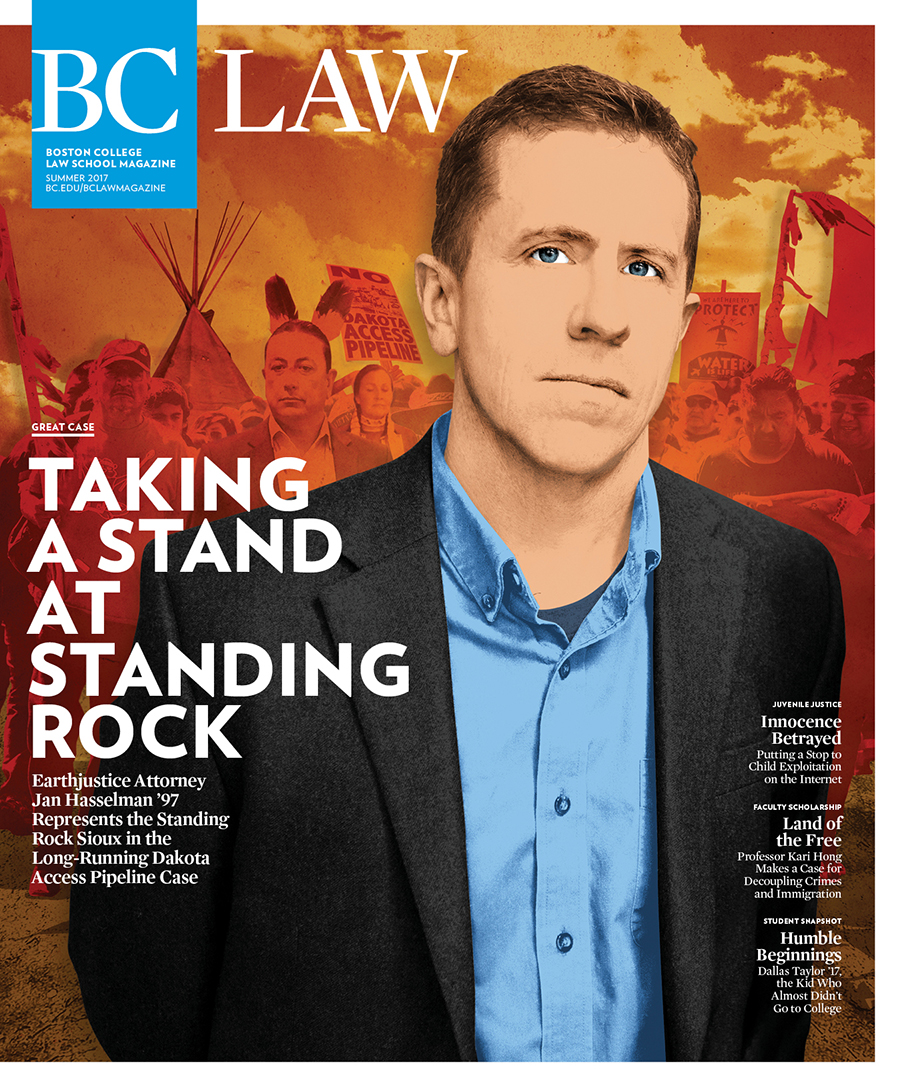PocketRésumé
Diplomas: Swarthmore, BA; Columbia, JD. Credentials: Clerked in US District Court of Northern District of California and Ninth Circuit Court of Appeals. Focus: Immigration consequences of criminal convictions, immigration policy, contemporary matters in criminal law. Cited: By New Jersey Supreme Court and in briefs to US Supreme Court. Scholarship: In University of Virginia, UC Davis, Cardozo, and Georgetown law reviews and journals. Fun Fact: While in private practice, prepared 100 actions in the Ninth Circuit.
The Idea: Congress should repeal the Illegal Immigration Reform and Immigrant Responsibility Act. IIRAIRA became law in 1996, along with a wave of tough-on-crime laws, and like them, it removes discretion from judges and does violence to basic conceptions of fairness, according to Assistant Professor Kari Hong. It also does economic harm, imposing huge costs on government, depriving the economy of needed workers and entrepreneurs, and threatening the Social Security system as well as social harmony.
The Impact: Until recently, Hong did scholarship in two fields, family law and immigration. But with Donald Trump’s campaign and presidency, she says she has felt “a renewed urgency” to speak out on immigration. Recent months have seen a flurry of activity by the former immigration law practitioner, including an article in the law review of Cardozo Law School and two in the law review of UC Davis, as well as op-eds in the Washington Post and Boston Globe. Hong has been all over media, too, as a source for stories in the Globe, Boston Herald, USA Today, CNN, and ABC and a guest on TV and radio talk shows.
Titles of Hong’s recent articles (“The Absurdity of Crime-Based Deportation,” “Costs of Trumped-Up Immigration Enforcement”) bespeak her opposition to the Trump immigration policies. She also disliked Barack Obama’s policies—Obama, she notes, deported 2.5 million noncitizens, more than were deported in all of the twentieth century—but she predicts that if Trump prevails, he will easily beat Obama’s record.
While not absolving either president, Hong blames the current immigration mess chiefly on IIRAIRA, signed into law by President Bill Clinton. Where its precursor, the Immigration and Nationality Act of 1952, allowed judges to weigh immigrants’ criminal convictions against their likelihood of contributing to society, IIRAIRA forces judges to deport any immigrant convicted of an aggravated felony, a poorly defined term that has come to include things like shoplifting, possession of a marijuana cigarette, and traffic violations.
“The Illegal Immigration Reform and Immigrant Responsibility Act forces judges to deport any immigrant convicted of an aggravated felony, a poorly defined term that has come to include things like shoplifting, possession of a marijuana cigarette, and traffic violations.”
IIRAIRA also makes many noncitizens—those who’ve lived in the country for less than two years or been arrested within 100 miles of the border—eligible for “expedited removal,” deportation on the say-so of an immigration agent, without an appearance before a judge. “We know mistakes were made by immigration agents under Obama,” including several deportations of US citizens, Hong recalls. “But Obama tried to keep them curtailed. Now, under Trump, the gloves are off.” Trump’s executive orders require deportation not only of those convicted of crimes but also of people charged with crimes but acquitted and of those who represent a threat to public safety, as determined by an immigration agent. The first two people detained under Trump’s immigration policies, Hong reports in a recent article, were mothers of US citizen children whose only crime involved using fake identification in order to obtain work.
Even under Obama, the budget for enforcement, including immigration agents, courts, and jails, totaled $18 billion annually, more than those of the FBI, DEA, and US Marshal Service combined. And the cost of deporting everyone here without legal status, as Trump’s executive orders contemplate, would total $400 billion to $600 billion, the New York Times has estimated.
Besides, draconian immigration policies are self-defeating, Hong maintains. As an aging society, the US depends on immigrants not only for manual labor but also to staff our health care system and high tech firms, to pay taxes that our government depends upon, and to undergird Social Security. “If Donald Trump deports everyone he’s targeting,” Hong predicts, “we will take out one-third of all small business owners, doctors serving rural hospitals, those who pick our fruits and vegetables.”
During seven years of solo practice in California and Oregon, Hong specialized in immigration appeals. Precedents created by successful appeals, she reasoned, would yield the greatest benefits for the most people—and also do the most to advance social justice.
That same reasoning underlies BC Law’s Ninth Circuit Appellate Program, a clinic founded by Hong. Since 2014, student lawyers have argued eight immigration cases in the West Coast circuit, prevailing in five (two still await a decision at press time). In the 2015 case Lopez-Valencia v. Lynch, an appeal by a permanent resident who was being deported for stealing one can of beer two decades before, the court ruled that petty theft is not an aggravated felony, a finding that’s been cited many times since.
That certainly helps, but for Hong the real solution is better immigration laws. While legislators shy away from the topic, a CNN poll in February revealed that 90 percent of Americans support a path to citizenship for undocumented immigrants. “It’s like the [recent rethinking of] tough-on-crime,” she says. “We should see a similar retreat from tough-on-immigration.”



